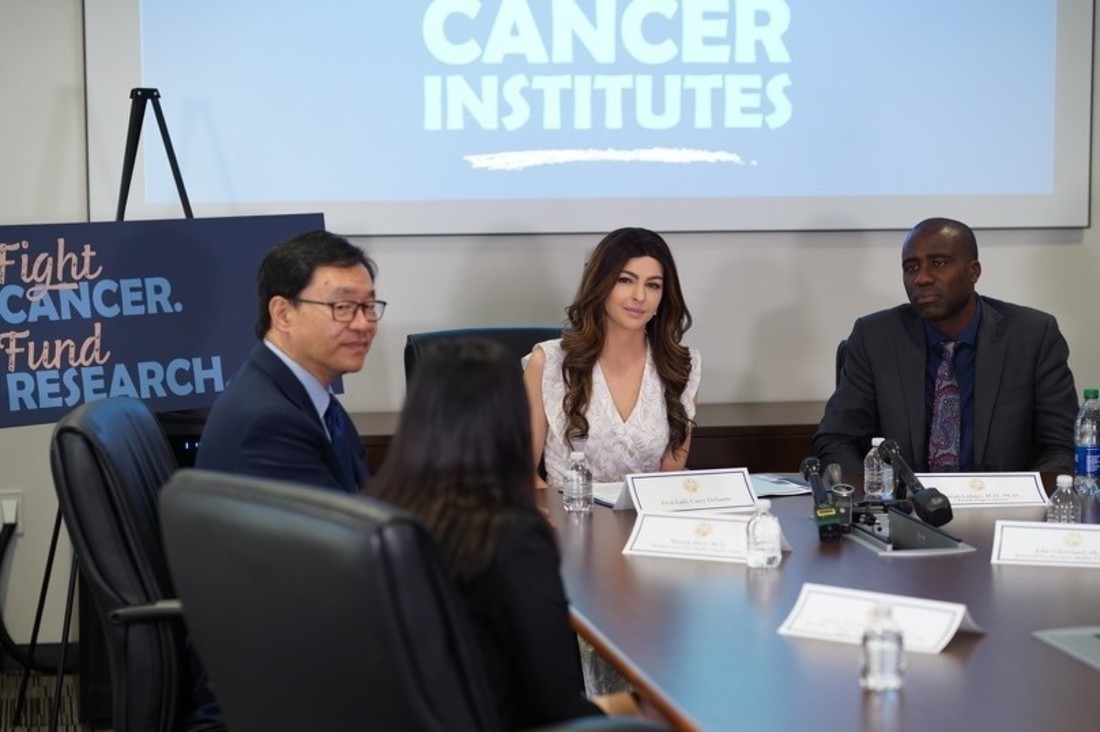
The proposal will be included in Governor DeSantis’ budget recommendation for 2022-2023, and is a $37 million (59%) increase over prior year funding
TAMPA, Fla. – First Lady Casey DeSantis announced Governor DeSantis is recommending $100 million for cancer research and care in his 2022-2023 budget, an increase of $37 million, or nearly 60%, over prior year funding. The funding will be used to forward cancer care and research at three cancer institutes in Florida — Moffitt Cancer Center, University of Miami Sylvester Comprehensive Cancer Center, and University of Florida Health Cancer Center. View the full roundtable HERE.
“Florida offers some of the best cancer care and research in the nation, and I’m proud that we are proposing historic investments in our leading cancer centers,” said First Lady Casey DeSantis. “The Governor and I are committed to helping cancer patients through innovative research and high-quality care. While we increase this important funding, I also urge Floridians to go through appropriate cancer screenings. Cancer is the second-leading cause of death in our state and now is not the time to delay care. I was honored to join experts in the cancer field today to discuss the urgency of cancer screening and to hear about the incredible innovative solutions our institutes are putting forward.”
First Lady DeSantis made the announcement during a roundtable at Moffitt Cancer Center with Florida Surgeon General Dr. Joseph Ladapo and representatives from the center.
“The Florida Department of Health fully supports the First Lady and Governor in their request for comprehensive funding to support the Florida Consortium of National Cancer Institute Centers Program,” said Florida Surgeon General Dr. Joseph Ladapo. “Florida’s cancer institutes are critical in providing treatment that saves the lives of patients with cancer. This funding will also continue supporting advancements in cancer research and treatments that can potentially lead to new cures. Thank you for your continued dedication to protecting Floridians now and into the future.”
“The funding announced today will greatly benefit our three homegrown Florida cancer centers — Moffitt, Sylvester Comprehensive Cancer Center at the University of Miami and UF Health Cancer Center — enabling these institutions to recruit the best and brightest from around the globe. It will allow us to bring teams and grant dollars to Florida to better support cutting edge discoveries, research and patient care, and make progress in the prevention and cure of cancer,” said Dr. Patrick Hwu, President and CEO of Moffitt. “We can’t thank the governor and of course the first lady enough for all their support in the fight against cancer.”
In 2014, the Florida Legislature established the Florida Consortium of National Cancer Institute Centers Program to enhance the quality and competitiveness of cancer care in the state. The initiative funds three cancer institutes in Florida that are or are seeking to become National Cancer Institute (NCI) designated.
- Moffitt Cancer Center (designated National Cancer Institute comprehensive cancer center)
- University of Miami Sylvester Comprehensive Cancer Center (designated National Cancer Institute)
- University of Florida Health Cancer Center (applying for National Cancer Institute designation)
Over the last three years, the Consortium has provided treatment to more than 67,000 newly diagnosed cancer patients, educated nearly 32,000 current and future clinicians and scientists on the latest advancements for cancer diagnosis and treatments, and shared research findings through 75 distinct collaborative publications. Florida also provides funding for separate initiatives that support pediatric cancer research, and grants that support cancer research at other institutes that are not NCI designated.
Funding for Cancer research and treatment programs has become even more important in the wake of the COVID-19 pandemic. According to a study released in May by the University of Kansas Medical Center, nearly 9.4 million screenings for breast, colon, and prostate cancers did not occur in the U.S. over the first year of the COVID-19 pandemic. The disruption in cancer screenings highlights the importance of increased funding for treatment and research in the FY2022-2023 budget.
Since 2014, cancer has been the second leading cause of death in the state of Florida, behind heart disease. In 2021, the American Cancer Society estimates there have been over 47,000 deaths attributed to cancer in Florida. Florida also has the second highest cancer burden in the United States.
###